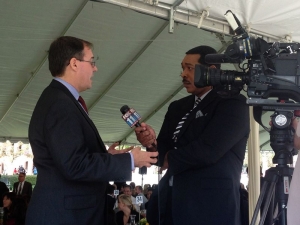L.A. Mayor Lauds USC for Leading Military Social Work, Castro Presents on Veterans
October 14, 2013 / by Claudia Bustamante- Research
The USC Price School of Public Policy held a daylong conference Oct. 8 to discuss the needs of returning veterans, especially with regard to employment and housing.
The conference, “Work and Home: Addressing the Urgent Needs of Returning Veterans,” featured a number of high-profile speakers, including opening remarks by Gen. David Petraeus, USC Judge Widney Professor, and affiliated faculty with the USC Center for Innovation and Research on Veterans & Military Families (CIR) at the USC School of Social Work, and a keynote address by Los Angeles Mayor Eric Garcetti.
During his remarks, Garcetti lauded USC for its leadership role, especially in the area of military social work, and announced plans to establish a city Office of Veterans Affairs that would develop a comprehensive strategy for Los Angeles and create partnerships among the city’s many stakeholders.
“I will be looking at CIR to equip our city with tools and resources to serve our veterans,” Garcetti said.
To that end, Carl Castro, USC School of Social Work assistant professor and research director at CIR, was a featured panelist during the conference. Castro said the greatest challenge facing veterans is employment; however, he was quick to add that just giving a veteran a job does not address the underlying issues that could impede a successful transition to civilian life.
“We know that the well-being of a veteran is dependent on their relationships with others and themselves,” Castro said. “Without that sense of belonging and purpose, many veterans will struggle back home.”
Another struggle is combating the misperception by the general public, including employers, that a majority of returning veterans suffer from post-traumatic stress (PTS). Castro said the rate is much lower — about 7 percent to 9 percent of those deployed. Even if they do suffer from PTS, most are high-performing, he added.
“We need to highlight that a lot of veterans do make a successful transition because of the skills, talents and leadership they develop in the service,” Castro added. “They shouldn’t be discriminated against because of the fear of post-traumatic stress.”
To reference the work of our faculty online, we ask that you directly quote their work where possible and attribute it to "FACULTY NAME, a professor in the USC Suzanne Dworak-Peck School of Social Work” (LINK: https://dworakpeck.usc.edu)
